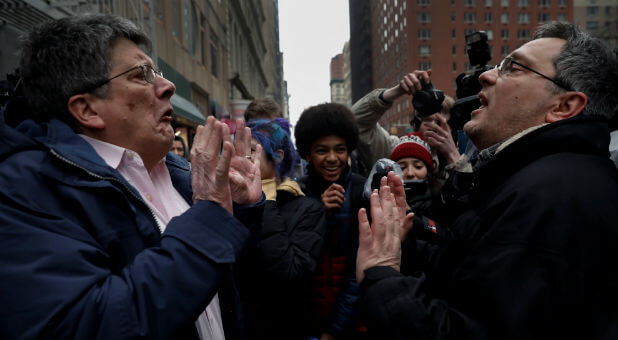I was recently awakened at 4 a.m. after having one of the most disturbing dreams I’ve ever had. After much thought and reflection over the next few hours, I knew I should share its contents. It showed I was in a high-level government meeting, watching as the terms for our surrender as a nation were drafted and in final review.
What I saw was horrifying. I’m not here to say that I have prophetic dreams or even here to speak prophetically about what I saw. They say that, many times, our dreams are our greatest fears or our highest hopes. Perhaps it was simply a greatest fear, or even what I had for dinner. Either way, it was horrifying, and my thoughts went immediately to my children.
There is so much division in our nation right now, but this has been the case for over 200 years. There was political division even during the Revolutionary War—while we were still at war. Some, historically, protest in the streets, while others protest at the ballot box. Neither less passionate, just some more vocal. But I feel compelled to say what has been laid on my heart to say:
When it comes to laws and public policy, which is what the legislative and executive branch make, what divides us are our non-negotiables. I have mine and you have yours. And when our non-negotiables differ, division is inevitable. I have six that guide my voting decisions; you may have more or fewer that guide yours. We all have them. This has been true for over 200 years as well. What is different today is that our non-negotiables are no longer simply political ideology. Today, and for the last 30 years at least, our non-negotiables are moral imperatives. And when it comes to moral imperatives, there is nothing you are going to say to change mine, and there is nothing I am going to say to change yours.
But as I read the latest brain research and studies on why we believe what we believe, these moral imperatives are being found, more and more, to be far more physiology and far less ideology. Far more heredity than a result of our collective experiences. This is why we find ourselves saying we cannot fathom why a person would see these moral imperatives in a different way. So to espouse these views in social media and in public discourse in lengthy explanations and staunch posturing on our moral imperatives only serves to anger and alienate those whose imperatives are different —and often, the very lost souls we are trying to reach.
Because we have a Creator in whose image we were created, it is still possible to love and respect each other and care deeply about one whose moral imperatives are different than our own.
There will always be this divide on moral imperatives. But what grinds us to a halt as a nation is when we cannot have objective dialogue on the many issues beyond our non-negotiables. We have to have those conversations or else all we will have is a nation ruled by a monarchy.
What’s tragic about the current state of public discourse is that there isn’t any. Just endless position statements and political talking points. We can even pick the news station that will espouse the views we most agree with, and all objectivity is lost in the places most Americans depend on to get their information.
At some point, we have to talk about the issues that are dividing us. Issues such as racism, reverse racism, culture, climate change, our origins, violence, homelessness, education (public and private), higher education (public and private), discrimination, reverse discrimination, care of our veterans, states’ rights, immigration and so much more.
We are a nation divided because we fear that, to have these discussions and come to greater levels of understanding and common ground, will weaken our position on our moral imperatives. We have made our moral imperatives a line in the sand and a prerequisite for discussion of anything else. Far too many of us have decided that unless you stand on my side of that line in the sand on my moral imperatives, we cannot have discussions or seek middle ground on anything else.
However, the greatest danger to our republic and the greatest threat to our national security isn’t even our inability to have these discussions. It is the hate in our hearts for those who see the world differently. I would die standing for my moral imperatives—should someone decide I must if I refuse to change, and maybe you would too. The real problem is that we are much closer to that day than you might imagine. And people are being martyred all over the world for the same imperatives I hold dearest. Our point of greatest weakness to threats foreign and domestic are when we are most vulnerable—and we are most vulnerable when we are most divided.
So maybe before we post on social media, we need to see the face, heart and family of the human being who has chosen to call you friend, historically and on social media, before we start the post—and certainly before we hit that button. While your post may make you feel better, the division you are causing may be a much higher price to pay than you intended. Peace. {eoa}
Dr. Rich Rogers is editorial director for Kingdom Connection and Free Chapel Church as well as author of Next Level Living and Next Level Parenting, both Charisma House books.














































